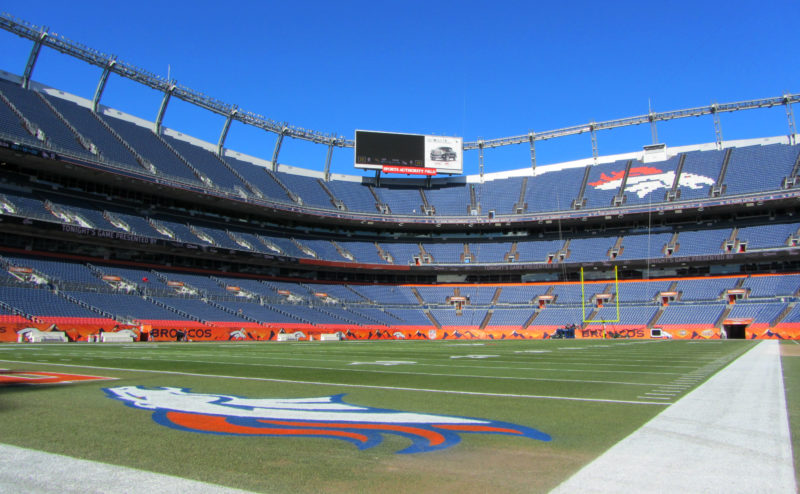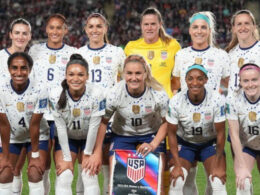By Rhonda
Billionaires have an ungodly amount of money. You know, f*** you money, and ultimately, they get to do whatever they want with it. So why the heck wouldn’t they buy a sports team? That’s what Walmart heir, Rob Walton, must have been thinking when he bought the Denver Broncos for $4.65 billion, the most ever paid for a sports franchise. Walton will become the richest NFL owner with a net worth of over $58 billion. That’s more than the NFL’s current four wealthiest owners combined – David Tepper, Kansas City’s Hunt family, Stan Kroenke and Jerry Jones. His net worth towered over the other three groups bidding for the Broncos. They didn’t stand a chance.
Walmart heir Rob Walton is buying the Denver Broncos for $4.6B, the highest price ever paid for a sports team.
1. Broncos: $4.6B
2. Nets: $3.3B
3. Chelsea: $3.1BBut the biggest winner might be David Tepper, who paid $2.2B for the Panthers in 2018.
That now looks like a steal. pic.twitter.com/hlnfIZI1At
— Joe Pompliano (@JoePompliano) June 8, 2022
So why do billionaires buy sports teams? Simple answer – because they can. Personally, it was a dream of mine growing up and I don’t see many downsides, but let’s dig deeper.
The upsides. You could say it diversifies their portfolio and offers another revenue stream (as if they need more money). But I think it’s more about the prestige that goes with saying you are the OWNER of the Denver Broncos. This is much cooler than being an upper-class fan. Some owners buy teams to boost their profile and to show how rich they are. Also, I can’t imagine Mark Cuban doesn’t have fun with his job and being the boss of a franchise he made a champion. Others just plain love sports or are truly fans of the team and feel that with their money, desire to win, and knowledge, they could create a winner with a franchise. They have visions of a Super Bowl dancing in their heads.
With a billionaire like Walton at the helm, that vision could come true. His purchase changes things entirely for the Broncos, who have been living on the edge for many years. Now, they won’t be outbid in hires for football operations and coaching. And while the salary cap limits team spending on players, collecting the money for contract guarantees that must be put into escrow upon signing won’t be an issue.
Intense competitiveness is one of the characteristics often associated with Walton. Perfect for an NFL owner. He’s a careful note-taker who is said to have a photographic memory, and in maintaining the role often given to an older brother, the important person in keeping communication open with his family and the titanic family business. Then, there is the attitude that comes along with his billions. Walton believed that in his 78th year of life it was as good a time as any to venture into NFL ownership. “I learned from my dad that change and experimentation are constants and important. You have to keep trying new things,” Walton said in an Andy Serwer profile written for Fortune.
However, there are some cons to owning a team. Sports teams and leagues are not immune from economic downturns. Demand for sports entertainment depends on the overall economic climate. Following the 2008 financial crisis, attendance at many sporting events was low for years. People go to sporting events if they have the money. In other words, a change in someone’s income or a change in the costs of tickets has a serious impact on demand for tickets, merchandise, and pay-per-view.
There is the ugly too. As an owner, you need your staff and your players to stay away from scandal. Case in point – Washington Commanders owner, Daniel Synder. The Washington Post published a series of articles alleging that over 40 women who were former employees of the organization, including office workers and cheerleaders, had been sexually harassed and discriminated against by Snyder and other male executives, colleagues, and players of the team since at least 2006. No bueno.
Despite those drawbacks, owning a sports team is insanely profitable. There is no better evidence than John Elway declining an offer to own 20% of the Broncos in 1998. He instead put $15 million into a Ponzi scheme that left him $7 million in the hole. That 20% stake in the Broncos would be worth between $800 million and a billion dollars today.
Put the cons aside, buying a sports franchise is a dramatically popular practice for billionaires of today, and countless major or premier league teams are owned by the super-rich. Plus, there comes a point in the life of a mega-wealthy individual when they have more money than they can spend. Through shrewd business sense, entrepreneurship and investments, they’ve accrued a fortune so huge that there’s no way they could ever lose it. Economic downturn or not.
Everybody wants to own a sports franchise these days. Billionaire Jerry Jones, who owns the most valuable franchise in the world, the Dallas Cowboys, says he could get $10 billion for his team but he will “never” sell it. The prestige, the fun, the Super Bowls, the beautiful stadium. No amount of money can replace the high of owning a sports team.
How much does Jerry Jones think he could get for the Cowboys?
“More than $10 billion.”
Jerry: “But let me make this very clear. I’ll say it definitively. I will never do it. I will never sell the Cowboys. Ever.” https://t.co/idoBD63GGC
— Jon Machota (@jonmachota) May 16, 2022
Say you are billionaire Steve Ballmer. You attended Harvard University with a double major in Mathematics and Economics. You are pretty smart. You are hired by Bill Gates and serve as the CEO of Microsoft for 14 years, owning 333 million shares. You step down as Microsoft CEO. That was hard work. Now you have your billions. It’s time for fun. You purchase the Los Angeles Clippers. Why not?
Photo Credit: Chad Claeyssen





